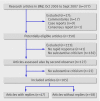Adequacy of authors' replies to criticism raised in electronic letters to the editor: cohort study
- PMID: 20699306
- PMCID: PMC2919680
- DOI: 10.1136/bmj.c3926
Adequacy of authors' replies to criticism raised in electronic letters to the editor: cohort study
Abstract
Objective: To investigate whether substantive criticism in electronic letters to the editor, defined as a problem that could invalidate the research or reduce its reliability, is adequately addressed by the authors.
Design: Cohort study.
Setting: BMJ between October 2005 and September 2007. Inclusion criteria Research papers generating substantive criticism in the rapid responses section on bmj.com.
Main outcome measures: Severity of criticism (minor, moderate, or major) as judged by two editors and extent to which the criticism was addressed by authors (fully, partly, or not) as judged by two editors and the critics.
Results: A substantive criticism was raised against 105 of 350 (30%, 95% confidence interval 25% to 35%) included research papers, and of these the authors had responded to 47 (45%, 35% to 54%). The severity of the criticism was the same in those papers as in the 58 without author replies (mean score 2.2 in both groups, P=0.72). For the 47 criticisms with replies, there was no relation between the severity of the criticism and the adequacy of the reply, neither as judged by the editors (P=0.88 and P=0.95, respectively) nor by the critics (P=0.83; response rate 85%). However, the critics were much more critical of the replies than the editors (average score 2.3 v 1.4, P<0.001).
Conclusions: Authors are reluctant to respond to criticisms of their work, although they are not less likely to respond when criticisms are severe. Editors should ensure that authors take relevant criticism seriously and respond adequately to it.
Conflict of interest statement
Competing interests: All authors have completed the unified competing interest form at
Comment in
-
Inadequate post-publication review of medical research.BMJ. 2010 Aug 11;341:c3803. doi: 10.1136/bmj.c3803. BMJ. 2010. PMID: 20702543 No abstract available.
Similar articles
-
Differences in review quality and recommendations for publication between peer reviewers suggested by authors or by editors.JAMA. 2006 Jan 18;295(3):314-7. doi: 10.1001/jama.295.3.314. JAMA. 2006. PMID: 16418467
-
Authorship criteria and disclosure of contributions: comparison of 3 general medical journals with different author contribution forms.JAMA. 2004 Jul 7;292(1):86-8. doi: 10.1001/jama.292.1.86. JAMA. 2004. PMID: 15238595
-
Importance of free access to research articles on decision to submit to the BMJ: survey of authors.BMJ. 2006 Feb 18;332(7538):394-6. doi: 10.1136/bmj.38705.490961.55. Epub 2006 Jan 9. BMJ. 2006. PMID: 16401629 Free PMC article.
-
Biochemia Medica's editorial policy on authorship.Biochem Med (Zagreb). 2015 Oct 15;25(3):320-3. doi: 10.11613/BM.2015.031. eCollection 2015. Biochem Med (Zagreb). 2015. PMID: 26525911 Free PMC article. Review.
-
ICMJE authorship criteria are not met in a substantial proportion of manuscripts submitted to Biochemia Medica.Biochem Med (Zagreb). 2015 Oct 15;25(3):324-34. doi: 10.11613/BM.2015.033. eCollection 2015. Biochem Med (Zagreb). 2015. PMID: 26526700 Free PMC article. Review.
Cited by
-
Post-publication critique at top-ranked journals across scientific disciplines: a cross-sectional assessment of policies and practice.R Soc Open Sci. 2022 Aug 24;9(8):220139. doi: 10.1098/rsos.220139. eCollection 2022 Aug. R Soc Open Sci. 2022. PMID: 36039285 Free PMC article.
-
Understanding the nature and scope of clinical research commentaries in PubMed.J Am Med Inform Assoc. 2020 Mar 1;27(3):449-456. doi: 10.1093/jamia/ocz209. J Am Med Inform Assoc. 2020. PMID: 31889182 Free PMC article.
-
Decoupling the scholarly journal.Front Comput Neurosci. 2012 Apr 5;6:19. doi: 10.3389/fncom.2012.00019. eCollection 2012. Front Comput Neurosci. 2012. PMID: 22493574 Free PMC article.
-
Five years of Trials.Trials. 2011 Nov 23;12:248. doi: 10.1186/1745-6215-12-248. Trials. 2011. PMID: 22112799 Free PMC article.
-
Letters to the editor in response to studies of guns in the home and homicide and suicide.Inj Epidemiol. 2017 Dec;4(1):3. doi: 10.1186/s40621-016-0100-9. Epub 2017 Feb 6. Inj Epidemiol. 2017. PMID: 28116657 Free PMC article. Review.
References
-
- Altman DG. Poor-quality medical research: what can journals do? JAMA 2002;287:2765-7. - PubMed
-
- Horton R. Postpublication criticism and the shaping of clinical knowledge. JAMA 2002;287:2843-7. - PubMed
-
- International Committee of Medical Journal Editors. Uniform requirements for manuscripts submitted to biomedical journals: writing and editing for biomedical publication. 2008. www.icmje.org. - PubMed
-
- Council of Science Editors. Home page. 2009. www.councilscienceeditors.org.
-
- World Association of Medical Editors. Home page. 2009. www.wame.org.
MeSH terms
LinkOut - more resources
Full Text Sources

